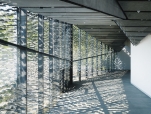Folk Art Museum in Hangzhou: Art of Traditions Preservation

Hangzhou is located 180 km from Shanghai on the east coast of China and is famous for its tea plantations and beauty of nature. Its population is about 1.75 million people, but every weekend a lot of people from all over China come here to visit wonderful local sights and gorgeous parks. To Hangzhou in China is even devoted a proverb: “Above there is a beautiful sky, but on the earth below, there is a beautiful Hangzhou.”
Despite the fact that the city has status of being incredibly green, it also remains a major industrial center with thousands of important Chinese corporations. Hangzhou also is a cluster of cultural attractions and is home to the Museum of knives, scissors and sword, Museum of umbrella, Fan Museum, and now the very original and above all sensitive to the surroundings China Academy of Arts’ Folk Art Museum designed by famous japanese architect Kengo Kuma.
Selection of the architect was not accidental as Japan in general and works of Kengo Kuma in particular are famous for combination of traditional flavour and modern technologies, as well as for an idea that architecture should always be linked with landscape, nature, local life, climate and literally formed out of all of this mentioned above.
China Academy of Art by itself (is one of the best higher educational institutions in the country) is located in the southern part of the city and its many campuses, designed by famous architect, Pritzker laureate and the dean of the Institute of Architecture of China Academy of Art – Wang Shu stretch along the river surrounded by lush greenery.
Full content of this issue you can read here
The full version of the article can be read in our printed issue, also you can subscribe to the web-version of the magazine
 Text: Elizabeth Klepanova
Text: Elizabeth Klepanova
Illustrative materials provided by Kengo Kuma & Associates
Photography: © Eiichi Kano


